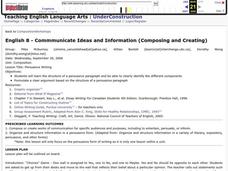Curated OER
Campaign Trailblazers
Explore the backgrounds, qualifications, and platforms of the presidential candidates for the 2000 election. Though the instructional activity is outdated, the activities within the informational text could be good practice for your...
Curated OER
Persuasive Writing
Eighth graders study persuasive writing. They analzye an editorial for introductory,body, and concluding sentences. They develop arguments for and against various topics in small groups.
Curated OER
Argument
In this debating activity, learners study the titles of the five debates. They write two opposing points of view for each debate. Pupils try to persuade for both sides of the view point.
Curated OER
Debate the Daily Dilemma
Have your class practice their persuasion skills by participating in a class debate. They will discuss a dilemma and detail each point of view. Divided into both sides of the argument, they work in groups to create a well-rounded...
Curated OER
The Game of Persuasion
Why is it so important to learn the art of persuasion? Being persuasive helps you acquire the things you want or the things you feel are necessary. Print out these scenarios and assign one to each group of high schoolers. As a team, they...
Curated OER
Whose Side Are You On?
Students role play, persuading and staying neutral during arguments. In this viewpoint instructional activity, students examine the viewpoints of soldiers in the Spanish-American War and role play. After a discussion, some students try...
Curated OER
Building a Better Argument
Students create good arguments by exploring the basic structure of an arguments. They determine premises and conclusions for analyzing the effectiveness of arguments. In addition, they explore the differences between arguments and...
Curated OER
Fallacies
Students examine the ten most common logical fallacies. They identify the ways in which arguments fail. Students give reasons why one or more premises or conclusions can cause an argument to fail based on the ten logical fallacies they...
Curated OER
Preparing Arguments
Students review the information from the previous lesson on persuasion essays. In groups, they brainstorm a list of arguments to use to support their trip to Six Flags. They also develop counterarguments and gather information to put...
Curated OER
Topical Discussions
Learners share their opinions on controversial topics. They list their arguments and give reasons for thier position. A paper is written to reflect their views.
Curated OER
I Really Love This More
Young language arts learners choose between two activities and then attempt to convince their classmates of their choice as a way of practicing persuasive speech. This particular lesson uses Valentine's Day as a theme; learners chose...
Curated OER
Emotion or Reason?
Students use persuasive devices to construct oral or written arguments. In this arguments lesson, students discuss the types of persuasive devices used in arguments and form groups to select a topic to research. Students create a...
Curated OER
Seeing Both Sides of an Issue
Students develop arguments on both sides of an issue to see how it feels to understand opposing views. They try to think of all the reasons they might take the opposite position on the same statement: My way of doing things is the best...
Curated OER
Deductive and Inductive Reasoning
Students analyze and distinguish between deductive and inductive arguments. They produce, construct and evaluate deductive and inductive arguments. Each student reviews a list of key terms dealing with both types of arguments and...
Curated OER
Kirit C. Shah, M.D. v. Stan Harris and Nancy Harris Lesson 1: One Case, Two Sides
Students examine how lawyers prepare their arguments. They realize that both sides of a legal case may use the same cases as precedents in their positions. They find decisions of the Indiana Supreme Court and the Indiana Court of Appeals...
Curated OER
Using Pictures and Slogans to Persuade an Audience!
Students discuss how writers use various techniques to persuade an audience and examine examples used in the media. They interpret their thoughts and feelings about pictures, symbols and slogans and create an advertisement using the...

















